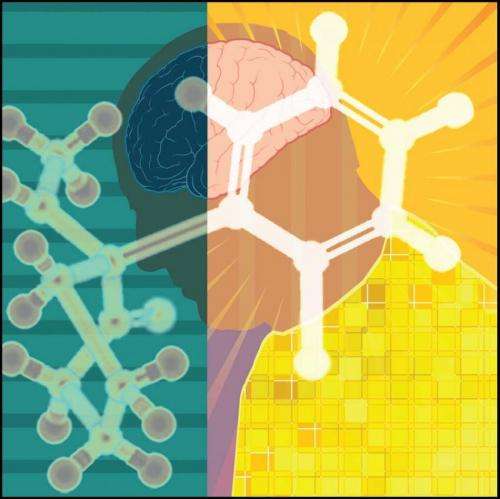Researchers identify new compound to treat depression

There is new hope for people suffering from depression. Researchers have identified a compound, hydroxynorketamine (HNK), that may treat symptoms of depression just as effectively and rapidly as ketamine, without the unwanted side effects associated with the psychoactive drug, according to a study in the July issue of Anesthesiology, the official medical journal of the American Society of Anesthesiologists® (ASA®). Interestingly, use of HNK may also serve as a future therapeutic approach for treating neurodegenerative disorders such as Alzheimer's and Parkinson's diseases, the authors note.
"The clinical use of ketamine therapy for depression is limited because the drug is administered intravenously and may produce adverse effects such as hallucinations and sedation to the point of anesthesia," said Irving Wainer, Ph.D., senior investigator with the Intramural Research Program at the National Institute on Aging, Baltimore. "We found that the HNK compound significantly contributes to the anti-depressive effects of ketamine in animals, but doesn't produce the sedation or anesthesia, which makes HNK an attractive alternative as an antidepressant in humans."
HNK is one of several different compounds produced when ketamine, an anesthesia medicine-turned-antidepressant, is broken down (metabolized) in the body. Using a rat model, researchers tested HNK to see if the compound alone could produce the same beneficial effects attributed to ketamine without ketamine's unwanted side effects.
In the study, rats were given intravenous doses of ketamine, HNK and another compound produced by ketamine metabolism known as norketamine. The effect each had on stimulating certain cellular pathways of the rats' brains was examined after 20, 30 and 60 minutes. Brain tissue from drug-free rats was used as a control.
Researchers found the compound HNK, like ketamine, not only produced potent and rapid antidepressant effects, but also stimulated neuro-regenerative pathways and initiated the regrowth of neurons in rats' brains. HNK also appears to have several advantages over ketamine in that it is 1,000 times more potent, does not act as an anesthetic agent, and can be taken by mouth, the authors report.
Surprisingly, HNK was also found to reduce the production of D-serine, a chemical found in the body, overproduction of which is associated with neurodegenerative disorders such as Alzheimer's and Parkinson's diseases. HNK's ability to reduce the production of D-serine, while stimulating the regeneration of neuron connections in the brain, may present a potential new therapeutic approach to the treatment of these disorders.
"HNK's unique properties increase the possibility of the development of a self-administered, daily treatment that works quickly and can be taken at home for a variety of central nervous system diseases," said Dr. Wainer. "This is a very exciting discovery and we hope that the results of this study will enable future investigations into this potentially therapeutic and important compound."
Dr. Wainer and several of the study's authors are listed as co-inventors on a patent application for the use of ketamine compounds in the treatment of bipolar disorder and major depression.

















